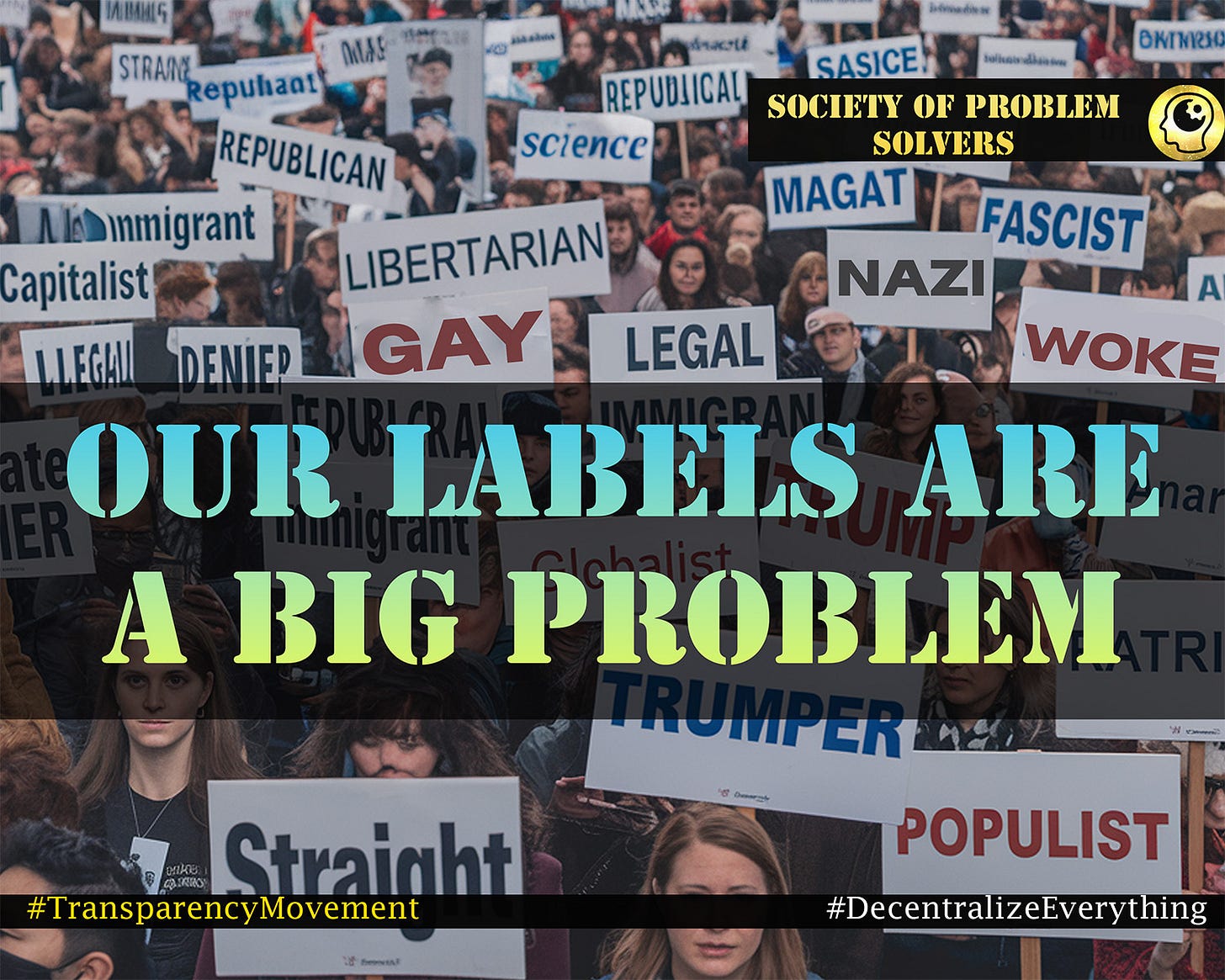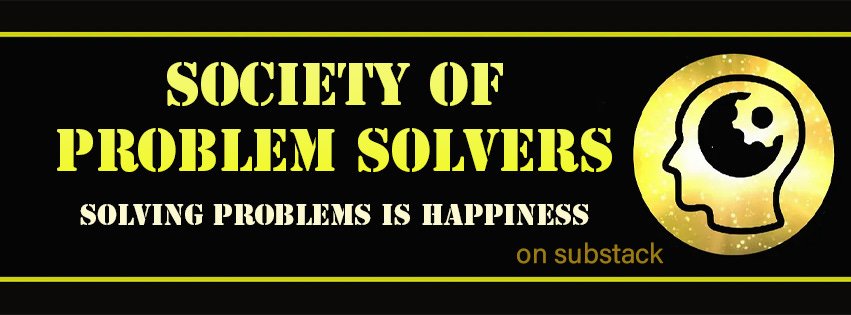Our Labels Are a Big Problem.
Group labels lead to echo chambers. Echo chambers lead to groupthink. And groupthink leads to tyranny.
Our labels are a big problem.
Humans are so caught up in our group labels that we don't realize the effect it is having on our society. Group labels divide us, and make group problem solving very difficult. Problems should be solved one at a time - by ideas - not by adherence to labels. Our allegiance should be to the solution, and the solution should be tied to metrics and results.
The people in powerful positions are using our drive to want to be part of a group against us. The only label that matters is “humanity,” as in: we are all unique humans. Labels detract from our individual uniqueness, and our ability to be creative and original. The evolutionary drive to want to be accepted into a group (a label) is strong enough to make us often subvert our other desires.
The way to fix this is to find ways to unify as humanity, and solve problems together. For example, against corruption.
Just look at some of these labels that divide us:
....labels such as left, right, boy, girl, Nazi, Jew, straight, gay, immigrant, racist, capitalist, Democrat, Republican, libertarian, climate denier, science denier, illegal immigrant, woke, cis, fascist, woman, MAGA, Trumper, socialist, communist, terrorist, anarchist, neoliberal, globalist, nationalist, patriot, extremist, radical, centrist, populist, elitist, establishment, deep state, conspiracy theorist, Zionist, anti-Zionist, Antifa, neocon, isolationist, progressive, nonbinary, trans, TERF, feminist, misogynist, chauvinist, alpha male, beta male, Karen, snowflake, boomer, Gen Z, millennial, white privileged, person of color (POC), the 1%, the 99%, working class, middle class, upper class, elites, blue-collar, white-collar, gig worker, welfare queen, trust fund baby, provision, homeless, gentrifier, anti-vaxxer, pro-vaxxer, gun nut, gun grabber, insurrectionist, peaceful protestors, carnivore, vegan, hipster, country bumpkin, coastal elite, Bible thumper, atheist, traditionalist, modernist, free thinker, troll, bot, NPC, fake news peddler, clickbait, grifters, influencer, blue checkmark, your religion, your education, your job status, your position, your degree, and your neighborhood, with Equity, equality, and equality of opportunity for all.
This is not the way. Unless your label helps solve a specific problem, it hinders group problem solving. We learn this from collective intelligence systems. Solutions in groups optimize when during the answering process all the people in the group are anonymous, and instead are only represented by their ideas or answers. When a system runs like this, the answers with the highest confidence scores are most consistently produced.
Groups of people can be amazing problem solvers that change skylines or invent new theories in fundamental science that alter humanity for the better. Or, we can be horrible war mongering tyrants. The way to achieve amazing group problem solving and avoid tyranny starts with avoiding labels. Then we can work from the bottom up by starting with the problem, and using decentralized, transparent systems like THIS to make decisions.
Can you name one time where tyranny didn’t have a group label? We can’t.
This is what happens with labels in groups:
Labels lead to echo chambers. Echo chambers lead to groupthink. And groupthink leads to tyranny.
When we drop our group labels we can make genies.
Hard to corrupt high-trust collective intelligence systems and label-free group problem solving is how we achieve unity instead of division. It is also how we can make what Tim Urban calls “SUPER GENIES” in his book “What’s Our Problem?” and avoid “GOLEMS.”
Thanks for reading, you unique individual, you.
All problems that do not defy the laws of physics are solvable.
Humans solve problems better in high-trust groups.
And Solving problems is happiness!
#CollectiveIntelligence
For over 3 billion years on this planet there were only single-celled organisms. Then one day they somehow learned to work together and make complex multi-celled creatures . Right now we are like those single-celled organisms. Our next evolution is finding how to work together, better… (like we wrote about here).
#SwarmAcademy #NetworkState #LEADERLESS #ResultsMatterMost #DecentralizeEverything #DemandTransparency
COMMENTS ARE FOR EVERYONE AS A PLACE TO THINK-TANK SOLUTIONS. They will never be for paid-only subscribers and we will never charge a subscription.





I don't just like this post. I love it!
It can be comforting to connect with people who share our values and priorities. Groups working together can do amazing things, but we lose our humanity when we assign negative labels to other groups with different priorities and unite to destroy them.
It can be challenging to remember everything we have in common when another group attacks ours. Tempting as it may be to think otherwise, Trump is human first and foremost. So are refugees and immigrants. MAGA's are not only human, they are actually Americans. Many of us have nationality in common but being "foreign" does not negate humanity.
Once we tune into our shared humanity all other differences fall away. Individual humans can disagree and argue about anything without losing mutual respect. We cn agree to disagree. Without divisive labels propaganda has nothing to grab onto.
I dig the desire to move beyond tribal heuristics and am glad to have found an article on it. Labels are often performative, exclusionary and fairly easy to co-opt, esp. in fragmented, low-trust/high-conflict media ecosystems. I, too, am worried about tribalism, echo chambers, and groupthink, which definitely make great tools for tyranny/authoritarianism.
That said, I’m not sure that labeling itself is the core issue, but rather how labels interface with institutional incentives and structural power/how labels are weaponized: by whom, for what ends, under what conditions?…
Perhaps the question is not as much about whether labels help you solve a problem in the moment, as it is about how they help mediate long-term coordination across time and structural asymmetries. For example, terms like “worker” or “tenant” don’t just signify identity/situational roles, but obviously ongoing material relationships and power dynamics as well. Are you saying we treat those as contextually useful, or as legacy remnants of a system we aim to move beyond?
Also, you mention that “there can be no tyranny without labels.” However, many modern systems of control/coercion—such as platform governance, algorithmic filtering/AI risk scoring, surveillance infrastructure etc—operate without any stable group identities/labels at all. In some cases, they may fragment identity/erode collective affiliation. So couldn’t de-labeled systems be just as vulnerable to consolidation and/or manipulation, especially when coordination is mediated by opaque tech or abstract procedural logic?
I’m also curious what a post-label model of collective action might look like in practice. If we remove group signifiers [almost] entirely, how do we go about building coalitions to be durable or coordinating across groups affected by material inequality? Or like how would we design systems that retain memory, accountability & epistemic pluralism?
So, is there a version of this (and maybe I’m missing something) that preserves the value of anonymity and epistemic humility/idea meritocracy, but still remains legible across uneven conditions, and resistant to capture over time?